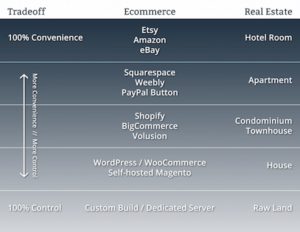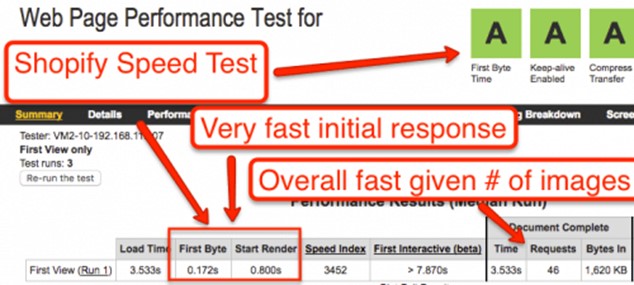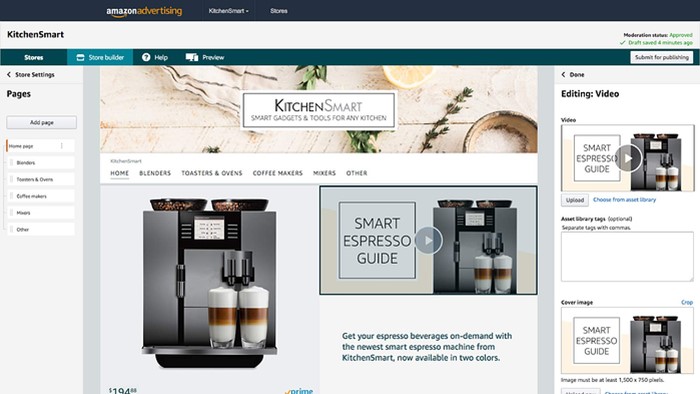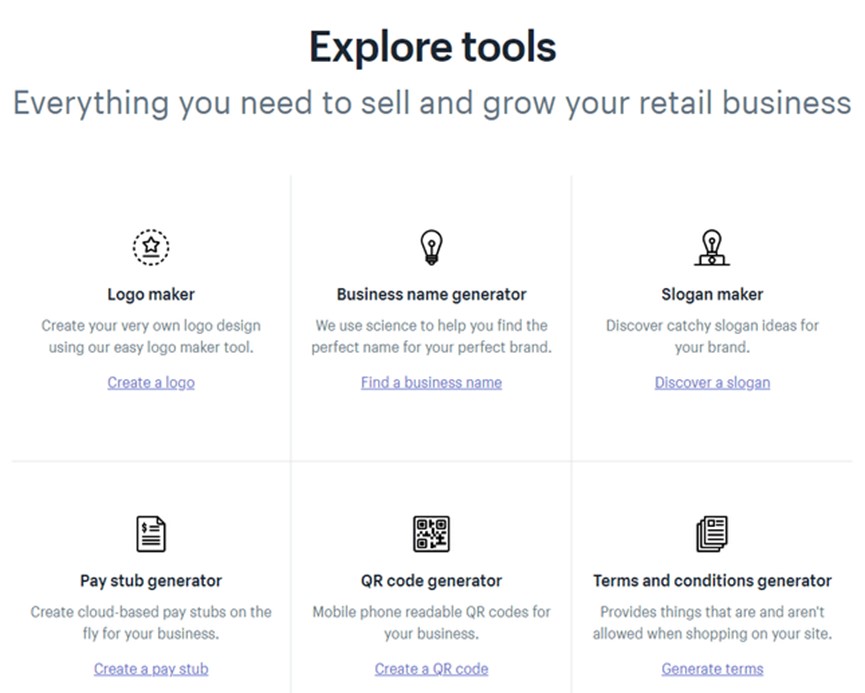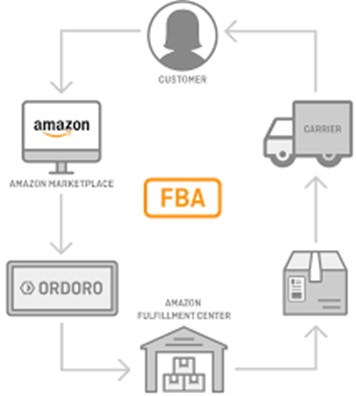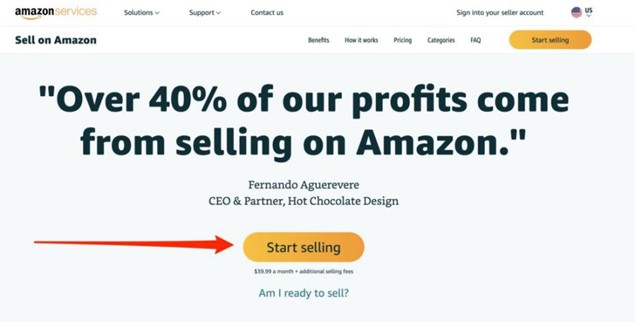Selling on Shopify vs Amazon: What’s better, to start a business with Shopify or Amazon?
Last Updated | January 18, 2024
Table of Contents
Selling on Shopify vs Amazon – Is it better to sell on amazon or Shopify
Shopify vs. Amazon is regarded as one of the most famous rivalries of all time in the e-commerce market. Both big e-commerce giants offer millions of sellers and shoppers. Some huge and basic differences make one competitive with another.
Here we have listed out some of the most common differences that you must know to distinguish them. The comparison includes the pros, cons, and other essential details that can help you choose between them.
According to small business owners and SMB masters, their answers were indeed surprising. Both platforms were their favorite in their own ways and were justified. Simply put, Shopify is a platform where you can market or sell your products while owning a store. It lets you build a brand identity Whereas Amazon lets you work with it for valuable sales pitching channels and driving back to Shopify.
Also, read our complete comparison between Magento and Shopify.
What’s the difference between shopify and amazon
How does shopify different from amazon
Shopify came in the year 2004, and the eCommerce platform was proclaimed in 2006. It is based in Ottawa, Ontario, Canada etc. With more than one million corporations in more than 170 nations, Shopify has earned its popularity in a very short time.
Shopify is known as a hosted platform of eCommerce that helps you to promote your business by connecting you to millions of sellers globally in a couple of seconds. It introduces your business, develops it and manages it in the world of eCommerce.
One best thing that Shopify has is its built-in clarification tool that helps ease the process of setting up an eCommerce store. They have over 70 formats accessible, and installments are dealt with through a built-in installment processor controlled by Stripe.
Shopify isn’t only for independent companies, either. They have eCommerce stores for mother-and-pop shops just as tremendous organizations, for example, Nestle and Tesla.
Pros of Using Shopify – Is Shopify Better than Amazon?
- One of the difficulties of running an online store is that you have double needs from your facilitating: you need it to be done quickly and you want it to be ultra-secure if you are handling debit cards. There are a lot of reasons that can cause hindrance to website speed, but, since Shopify can deal with speed optimization and security at a “worldwide” stage level simultaneously. They can do it particularly well. They give 100% SSL, keep their sites streaming swiftly, and cooperate with installment retailers well so that you can generally get paid, and clients are never expecting a lagged page.
Read Also Dropship T-Shirts Shopify: How to Start?
- eCommerce store development by yourself with platforms like WordPress, and WooCommerce and running it with Shopify is quite easy because of their client service. They have a huge database of FAQs, email/technical maintenance…and telephone support – with a real, learned rep on the other side. At the point when you are centered on running your online store. This safety net of continually having somebody at your back with solutions is essentially worth the Shopify membership cost alone. What’s more, on this point, Shopify particularly sparkles.
Read Also Shopify Plus Multiple Stores
- What’s the point of a huge online marketplace if it doesn’t even show up having dozens of sellers? Marketing is an aspect that Shopify is standout at. Shopify doesn’t feature the marketing tools on their site, but yes you can have access to them on their App marketplace. Marketing campaigns are made easier for Google ads, Facebook/Instagram ads, and emails. Shopify provides you with a platform to sell your words quickly and simply invent your landing pages. This thing is a very important factor in comparing Shopify Plus with other huge names.
Cons – Selling on Amazon vs Shopify
- For many customers who want to work with Shopify, pricinghttps://ecommerce.folio3.com/blog/what-does-shopify-cost/ is a matter of concern. The built-in credit cards and no transaction fees seem to be very costly. But Shopify is much more affordable as compared to other small vendors or businesses until you lock down your investment with Shopify. The Shopify prices are slightly linked to one another, so one has to contrast them based on their specs and features.
Read Also Shopify SAP Integration
- When it comes to customization, they work with an extraordinary set up to customize the themes according to their PHP templates. So this thing possesses a bonus point in various ways but it can be irritating for the customers that want to revamp the things without doing full-on.
- The last con of utilizing Shopify for your online store is its underlying arrangement process. With the arrival of Shopify 2 – Shopify has certainly made the underlying arrangement of your online store a lot simpler – yet it despite everything is not a “simply include water” bit by bit. It’s simple as it were, yet I think they oversell it a piece. It requires a tad of specialized skill (particularly to get your space name diverting accurately).
Read Also the Shopify affiliate program
AMAZON – Is it better to sell on Shopify or Amazon
Amazon is the largest popular international online marketplace and a cloud-based system services provider unline Shopify SAAS-based eCommerce platform. A place and a platform, where you can sell your products hassle-free.
Read Also How To Update Inventory In Shopify
Amazon Web Services (AWS) is a comprehensive, evolving cloud-based program. The initial of AWS offerings was founded in 2006 to render online services for sites and custom applications. Amazon’s Elastic Compute Cloud (EC2) and Easy to storage Service (S3) are the fundamentals of the company’s large and developing collection of Web services.
Read Also How do I Make Shopify Coming Soon Product?
Amazon is situated in Seattle, Washington. The company has solo sites, software centers, client support systems, and feedback centers in numerous places across the globe. One of the most superb things regarding Amazon is that they receive a huge response; the store connects with more than 150 million views per month only in the US. The built-in feature confers the business with a large number of potential buyers.
Small or tiny vendors that prefer to do business online would like to move on to Amazon. This is because small business owners can’t afford to sell products on large platforms. However, large companies also sell customized products on Amazon.
Shop vs Amazon – Pros of Using Amazon
- Amazon being the largest online retailer has to offer an opportunity to expand your business on an international basis. It provides your business worthy fame along with reach to different locations worldwide. This platform also allows and enables you to sell your products hassle-free.
- If you’ve gone through the Amazon’s regulations and itemize the products with regard to Amazon’s policy. The sales and income would give rise to your business. Amazon perceives the amassing number of visits and views so it’s impossible to see the pros of wide exposure. Cheers to Amazon’s product catalog system which provides ease in searching your exact product to the main audience as Inventory management ends with the most accurate location. Putting or allocating your business to Google searches would allow your business to grow.
- The best thing about online retailers is that clients don’t utilize them to look through a particular brand – they use them because they’re searching for a particular item. This raises your odds of pulling in engaging new clients because the probability of ‘finding’ your business is expanded.
Read Also How To Develop An Ecommerce App On Shopify?
Cons – Shopify versus Amazon
- Even though your revenue makes certain to increment by being on Amazon, it comes at an expense. Whether or not you have an expert record or you settle on FBA (Fulfillment by Amazon), you’ll despite everything be confronted with charges. It’s unquestionably worth doing your examination on your Amazon expense plan before setting up your commercial center record. Along these lines, there are upsides and downsides of working with Amazon as an online marketplace, yet before you make your brain up, we should investigate the benefits and drawbacks of utilizing your site as your go-to selling stage.
- Amazon being the largest retailer worldwide has to face the consequences of its competition to other sites. By joining a retail site, you should keep its guidelines. Amazon centers on the items, not the dealers. This implies you have restricted intends to feature your brand’s marketing.
Read Also building a website with Shopify from Scratch?
Features – Sell on Amazon vs Shopify
Money isn’t all that matters, which is the reason when you’re scrutinizing Shopify vs Amazon, you’ll need to investigate the features that each of them holds.
The fundamental highlight of Shopify is that you can have an exclusive eCommerce store. This favors your company since it permits you to emblem your organization and items on Shopify isolating them from other sellers on the same platform.
Moreover, there are magnificent eCommerce tools built-in with Shopify that assist you with advertising your store. These are the features that are not accessible on Amazon, which shows your items among any others that match search options.
- From a seller’s frame of reference, Shopify gives numerous eCommerce tools to all who have a store on their site. These cover a supreme stock framework, a logo producer, multi-channel selling alternatives, shopify amazon integration with other applications, and abandoned cart recovery and many others.
- Shopify permits organizations to obtain money through Visa, Discover, MasterCard, and American Express, just as 100 other payment maneuvers including PayPal and bitcoin. They permit organizations to offer client accounts on their store to endorse returning of the customer, grant marketing and Shopify SEO tools, social networking coordination, and analytics.
Read Also How to fulfill orders on Shopify Dropshipping
- That being stated, Amazon is one of the most humongous online retailers on the planet. In this way, they convey a customer base to you undeviatingly—without you doing any work related to marketing or customer pursuit.
- Another cool component of Amazon is you can choose them to deal with your item consummation, as well. With consummation by Amazon, you can dispatch your stock to Amazon, and they will deal with the packaging and send out your items when requests come online. Of course, you’ll pay an additional expense for this, yet it will take a substantial piece of the eCommerce procedure off the tray.
- Amazon grants the command to organizations to sell services rather than just selling items on their commercial site. This is done through Amazon Home Services and provides an opportunity for non-retail-specific organizations to be a part of their incredible store.
- The platform gives the individuals who list on their site with free analytical tools and reporting, the knack to take the prevalence of diminished delivery rates that the organization has contracted.
- A considerable amount of points are dubious when utilizing Amazon as your eCommerce platform. While you can splurge the name of your store, which accompanies a custom Amazon.com domain, and add a description to product listings, there’s little in the method for making your brand accessible apart from all the others on that platform.
- Shopify, interestingly, offers merchants an assortment of themes for their store page that a customer views which can be modified with more design efforts. While each retail store gets a free subdomain (ex: mystorehere.myshopify.com) sellers can decide to delineate to their very own space to build the marketing power.
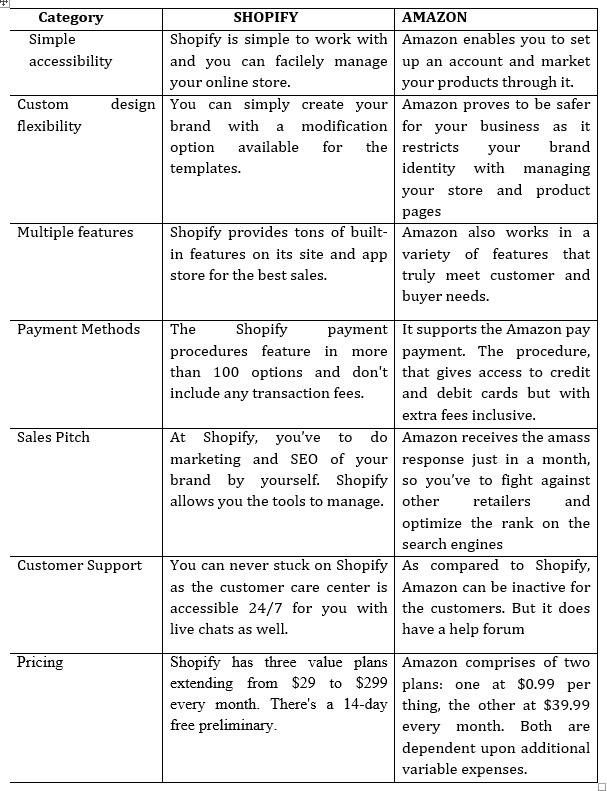
FAQS About Which is Better Shopify or Amazon
How is Shopify different from Amazon?
Shopify vs Amazon difference; the pivotal point to bear in mind is that Shopify is a particular eCommerce platform and Amazon is an online commercial site. Shopify confers you the devices to construct your special online store, while Amazon lets you sell through its commercial site conjointly with other online vendors.
Read Also Hire Shopify Professional Services
So selling through Amazon appears like having a stall in a popular boot fair. A huge number of individuals throng into the leaf through and purchase – the majority of them aren’t searching for your business specifically, despite everything you making plenty of offers due to everybody strolling past and flipping through your stall.
Selling with Shopify is progressively similar to leasing a building to set up your business. Once the public knows of your brand, customers especially pass an eye over your store to shop from. There’s more space to make an exceptional picture, even though it’s harder to transpire the normal client base.
As a result of these distinctions, Shopify and Amazon pander to various kinds of online merchants. Amazon greases the wheels for individual sellers up to little and medium-sized organizations. Shopify is perfect for everything from private ventures to bigger brands.
How does Shopify work with Amazon?
Step 1: Make sure your store meets the prerequisites.
- You’ll have to ensure a couple of things before you can begin selling on Amazon through your Shopify store.
- You need a functioning Shopify account on any arrangement.
- You should sell items that fit into a category
- Your store needs to list costs in USD or CAD.
- You should not be shipping your items using Fulfilment by Amazon.
Step 2: Create your Amazon seller account.
- Before you can begin selling on Amazon, you have to make a Professional Seller account on Amazon.com Seller Central, with selling on Amazon.com empowered.
- Start by visiting Amazon Services and clicking ‘Start Selling’.
- Next, fill in your name, email address, and pick a password to make your account.
- After creating your account, you will be taken through a few steps to wrap up setting up your account. You will require the accompanying data:
- Business name
- Business address
- Telephone number
- Credit card information (for Amazon to charge you month to month)
- Bank account data (for Amazon to deposit your sales proceeds)
- Taxpayer Identification Number (US citizens)
Step 3: Apply for category approval
When you’ve made your Professional Seller account, verify whether the categories your items fit into require approval from Amazon.
Step 4: Add the Amazon sale channel to your Shopify store
- When you have made your Amazon Professional Sellers account, it’s an ideal opportunity to add the Amazon Sales Channel to your Shopify store.
- From Shopify, click the + button beside Sales Channels.
- In the Amazon by Shopify section, click Learn more:
- Next, click Add channel to affirm.
- On the last page, click Connect to Amazon.
Step 5: Purchase UPCs for your items
- If you don’t give a UPC, EAN, or ISBN, you will get an error message. At the point when this happens, you should include the item’s identifier to make another item detail page in the Amazon.com catalog or finish your stock contribution.
- If you are reselling items, they may have UPCs beforehand that you can utilize. If you have to purchase a UPC for one of your items, GS1 is the official provider, there may likewise be UPCs accessible from resellers at a lower cost.
Step 6: Create Amazon listings for your items
- In case you’re not selling on Amazon and you have items in a supported category, you can make your item listings directly from Shopify.
- Click Amazon to navigate to the Amazon sales channel.
- Next, click Create Listing.
- Find the item from your Shopify catalog that you need to list on Amazon and click ‘Select product’ at the base.
- Next, pick one of two alternatives dependent on if your item is made by your brand or made by another brand (which means you’re reselling).
- Whichever alternative you continue with, you’ll have to fill in the product details and click ‘Publish’ when you’re done.
Step 7: Claim existing Amazon listings in your Shopify store
Start by choosing ‘Link products’.
At the point when you see the Amazon listing, you need to link, click ‘Browse products, and quest for the item you need to link. After you’ve picked the required product to link to your Amazon listing, make sure to include any variants too.
Step 8: Set your inventory management policy
- For every Amazon listing in Shopify, you have the choice to utilize your store’s inventory settings, or physically deal with your Amazon inventory.
- If you decide to physically deal with your Amazon inventory, you can put aside a particular amount of inventory that may be accessible for Amazon purchasers. The amount will naturally diminish as buys are made on Amazon, yet you should manually renew your stock when you need to include more.
If you decide to utilize your Shopify store’s inventory settings, there are three potential situations for every item.
- Shopify tracks inventory
- Shopify doesn’t track inventory
- Permit clients to buy your item when it’s out of stock.
Step 9: Start selling!
- Your orders on Amazon will naturally sync with Shopify on the Orders page. Every single new order put through Amazon shows up in your orders list and is marked apart as Amazon. Shopify synchronizes entire orders, incorporating orders with items that haven’t been recorded through Shopify.
- Your clients will keep on receiving order notifications from Amazon, and you will get notifications from both Amazon and Shopify. You should fulfill your order through Shopify, in any case, the order won’t be refreshed in Shopify.
Which is less expensive, Shopify or Amazon FBA?
Considering the month-to-month subscriptions, Shopify is the least expensive alternative. Its most reduced option is the Basic Shopify at $29 every month. Amazon has its Professional Selling plan at $39.99 every month, in addition to additional selling expenses.
Read Also How To Integrate Alibaba With Shopify
If you join Amazon’s Individual Seller plan you don’t pay every month – rather you pay a $0.99 charge on each thing you sell. The additional seller expenses also apply to this particular plan.
The Amazon Individual Seller plan is the least expensive choice in case you’re selling tiny quantities – it’s reasonable for those selling under 40 things for each month. Yet, be cautious: you could end up paying around $40 every month on this plan.
Shopify vs dropshipping on Amazon. Which should be preferred and why?
There has been a constant debate on Shopify vs Amazon dropshipping. To expand upon what past analysts proposed it’s stated in the two cases you’re culpable for producing traffic to your retail store on Amazon and website on Shopify.
Indeed, there is a colossal measure of traffic on Amazon however if you don’t lead traffic to your listing page and make your item’s BSR (best seller ranking) surpassing to be found in the search results, you will still repudiate on the traffic on Amazon FBA.
It is sanctioned to abstain from doing dropshipping on Amazon (conditions apply) as the primary contention here is that since the fulfillment of an item is overseen by an outsider (for example provider or some other logistics organization) you’re not ensured from certain issues which may ensue while fulfillment. In any case, to guarantee the best customer care, Amazon applies a few forfeits to sellers who routinely neglect to fulfill on time to Amazon’s quality criteria. Ubiquitous and customary forfeits may promote the shutting down of the Amazon seller account. In this way, Amazon encourages sellers to utilize their own restrictive FBA – fulfillment by Amazon program (which is a better alternative but not perfect either).
On the other hand, considering Amazon vs Shopify dropshipping, with a store on Shopify you have more control and consistency (as referenced by different analysts) and can begin with a dropshipping business action clouting your immediate providers for order fulfillment.
In the case of Shopify vs Amazon affiliates, dropshipping is always preferred to retarget the customers whereas, in affiliate marketing, there’s no command on retargeting.
Learn More:
How to automate and customize your BigCommerce dropshipping?
Dropshipping to amazon from shopify
Selling on Amazon vs Shopify for an eCommerce start-up, which one’s better?
Amazon FBA vs Shopify for start-up purposes relies upon what sort of products you need to sell.
Here’s what you need to know about selling on Shopify vs Amazon equation:
On Amazon, you can begin selling and developing your business very quickly. Amazon has a tremendous amount of traffic. You can sell anything, as long as it is legal and you can grow quicker.
The drawback is less overall revenue, which usually is effectively abrogated by the volume. You have less authority over your business.
On Shopify, you have analogously more ascendancy over your business look and feel and you have better overall Shopify revenue. Then again, you will most likely need to contribute a huge measure of time and money before you will make the initial investment and begin bringing in money.
Less experienced eCommerce entrepreneurs may settle on amenity and fewer pains while the individuals who have the necessary assets might need to pick Shopify and keep up more authority over all parts of their activity.
Does Amazon own Shopify?
In 2015, Amazon shut down its Webstore business, which contended with new businesses like Shopify and BigCommerce. Additionally, Amazon was losing clients because of entrepreneurs’ interests over the effect that Amazon was having on their businesses.
Not long after declaring the shutdown of Webstore, Amazon said it would partner with Shopify to give web stores to the Shopify’s third-party dealer clients.
Wholly, according to many consumers from both the side we have reached to a conclusion and we suggest Shopify for anybody setting up their own online business. It gives you more strategic thinking and skills, a more grounded brand personality, and increasingly versatile evaluating.
Amazon is more useful for small vendors who would prefer not to pay a forthright expense, yet its variable additional charges make it hard to judge how rapidly those expenses could pile on.
Shopify proves to be better for the long term, and with an option to link Amazon into your Shopify store, you don’t need to pass up a great opportunity: it’s a success win!
You can shop both! Amazon FBA and Shopify.
When picking on an eCommerce platform, you don’t need to make a choice at all between Shopify vs Amazon FBA. You can utilize the two platforms for your business, simultaneously.
If you figure out a draft decently, consolidating both Shopify and Amazon into your comprehensive eCommerce subscriptions could be a colossal amelioration to your business.
You could utilize Shopify as the elucidation for your online store to concoct, where you would list each product you own, on a single spot, under your business’ particular branding.
Read Also SEO Best Practices for Migrating to Shopify
Simultaneously, you could list your items on Amazon to trespass upon the massive audience that visits the Amazon site every month. It could be an incredible method to isolate yourself from your opposition, not beyond your product category.
At last, this could direct clients to your Shopify store once they make a buy and be gratified by your products on Amazon.
Beyond the shadow of a doubt, eCommerce should be a fundamental piece of any business that sells items. Which platform you choose on in the Shopify Vs Amazon battle, however, is an individual’s opinion.
which is better Amazon or Shopify – Wrap-Up Shopify Vs Amazon FBA
In case you’re having a look at the choice between Shopify Vs Amazon FBA you’ll need to think out of the box and how you truly need to market your items. From that point, you will have the chance to make the deals and the advertising that you’re searching for. What’s more, you can feel extraordinary about either decision because the two will help you over the long haul.
FAQ About Shopify and Amazon
How does Folio3 offer top Shopify plugin development services all over the world?
Folio3 develops the Shopify plugin development services through well-curated and experienced teams. The company manages dedicated teams for every eCommerce platform, hence better outcomes. For instance, Folio3 tends to assign the Shopify developers team to a specific task, be it developing the plugin or the app.


